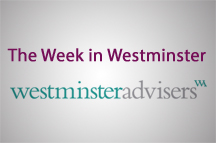 For a party once urged to stop banging on about Europe and tax cuts, it was quite a week. The PM signalled his intention to stop the ‘merry-go-round’ of workers on the minimum wage paying tax and then receiving money back from the Government in welfare payments. His announcement came ahead of Iain Duncan Smith’s appearance at Work and Pensions questions, where he was challenged by Labour to reveal the details of his £12bn plans to cut the welfare budget.
For a party once urged to stop banging on about Europe and tax cuts, it was quite a week. The PM signalled his intention to stop the ‘merry-go-round’ of workers on the minimum wage paying tax and then receiving money back from the Government in welfare payments. His announcement came ahead of Iain Duncan Smith’s appearance at Work and Pensions questions, where he was challenged by Labour to reveal the details of his £12bn plans to cut the welfare budget.
 IDS didn’t play ball, instead accusing Labour of increasing benefits in the run-up to elections in an effort to buy votes. When pressed on whether disability benefits would be protected from further cuts, he declined to answer in detail, stating only that the government would protect the most vulnerable while ensuring that those who could work did so. The detail of the cuts is said to have already been agreed between Mr Duncan Smith and George Osborne, who will announce them in July’s Budget.
IDS didn’t play ball, instead accusing Labour of increasing benefits in the run-up to elections in an effort to buy votes. When pressed on whether disability benefits would be protected from further cuts, he declined to answer in detail, stating only that the government would protect the most vulnerable while ensuring that those who could work did so. The detail of the cuts is said to have already been agreed between Mr Duncan Smith and George Osborne, who will announce them in July’s Budget.
The government also announced its intention to scrap or amend the Child Poverty Act, which defines how child poverty is measured. The Prime Minister and the Work and Pensions Secretary must have been relieved that a demonstration by disability campaigners failed to disrupt PMQs, which would have inevitably drawn more attention to the changes they want to make.
At PMQs and elsewhere, Europe loomed large over Westminster. Harriet Harman pressed David Cameron on what action Britain would take to tackle the disruption at Calais caused by thousands of migrants trying to get to Britain. Pity the PM, who had to maintain a delicate balance between sounding tough to Parliament while sounding reasonable to François Hollande, whose support is vital to the success of his renegotiation plans. Those plans have been knocked off centre stage of this week’s European Council meeting by the Greek financial crisis and the emergency migrant situation in the Mediterranean and the Channel. Mr Cameron had to lay out the principles of his renegotiation over a bad-tempered dinner, having toured European capitals recently to build relationships and drum up support.
 Michael Gove burnished his reformist credentials by announcing changes to the ‘creaking’ justice system. He attacked waste and inefficiency in the justice system, and the availability of a ‘gold standard’ of justice for the wealthy, with everyone else having to ‘make do’. The Justice Secretary also promised to make better use of technology in the justice system, and to consider whether cuts to the Legal Aid budget should be partially reversed. The creaking rail system caused a headache for Patrick McLoughlin, who was forced to announce major delays to upgrade work due to perceived performance failures at Network Rail.
Michael Gove burnished his reformist credentials by announcing changes to the ‘creaking’ justice system. He attacked waste and inefficiency in the justice system, and the availability of a ‘gold standard’ of justice for the wealthy, with everyone else having to ‘make do’. The Justice Secretary also promised to make better use of technology in the justice system, and to consider whether cuts to the Legal Aid budget should be partially reversed. The creaking rail system caused a headache for Patrick McLoughlin, who was forced to announce major delays to upgrade work due to perceived performance failures at Network Rail.
Elsewhere, the Liberal Democrats showed signs of life. In the Lords, they tried to use an amendment to the Psychoactive Substances Bill to amend government policy on a range of drugs, including the decriminalisation of all drugs for personal use. Lord Paddick called for a review of all existing drug laws, which received short shrift from his colleagues, including fellow ex-copper Lord Condon.












